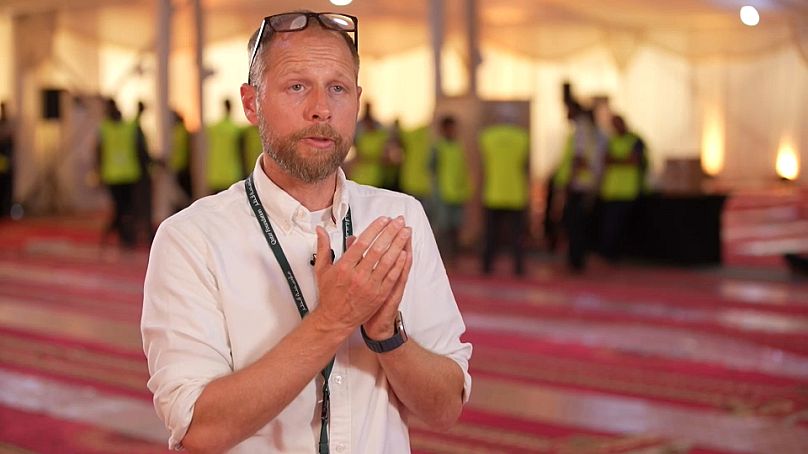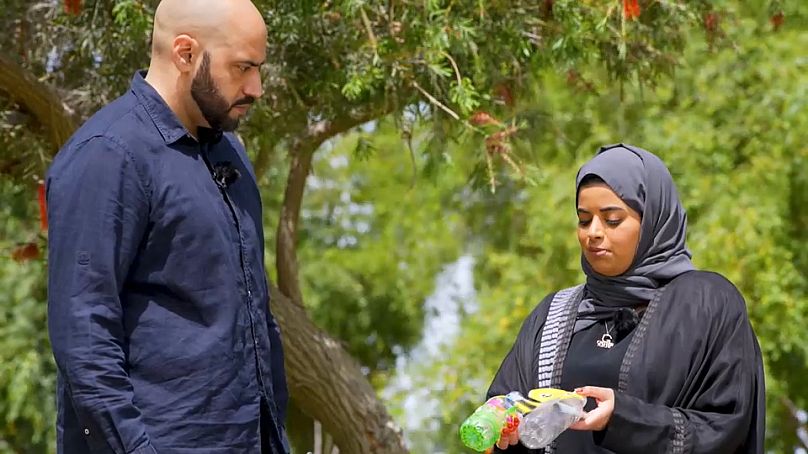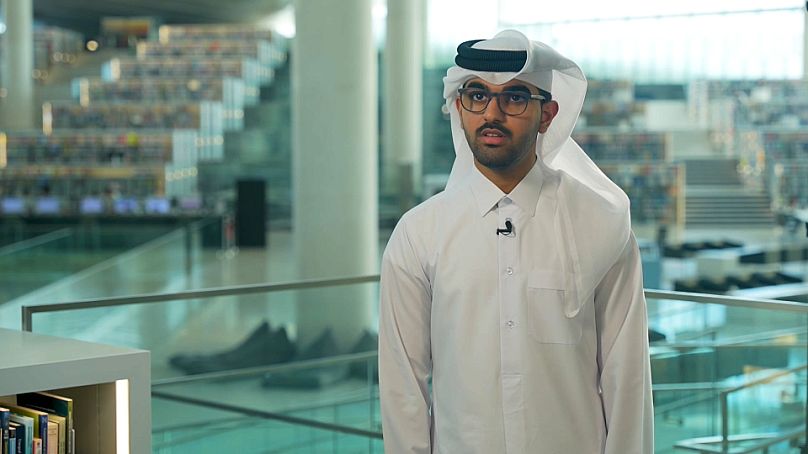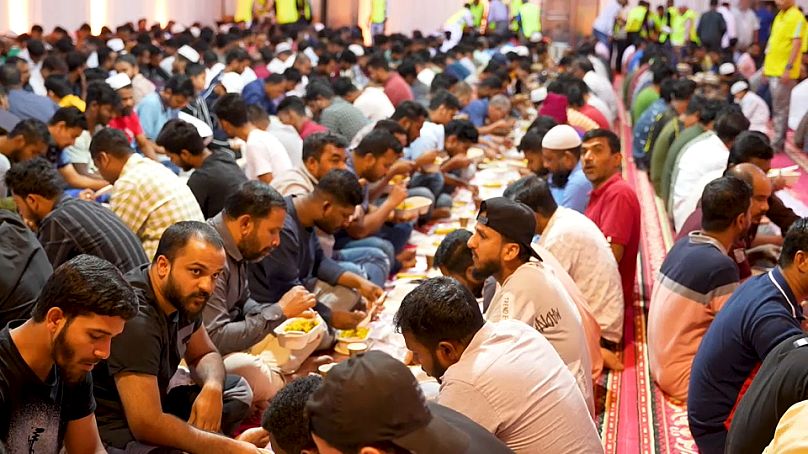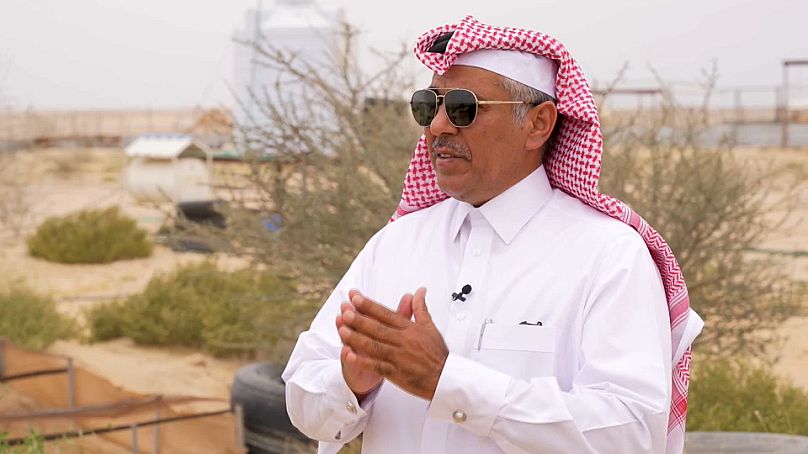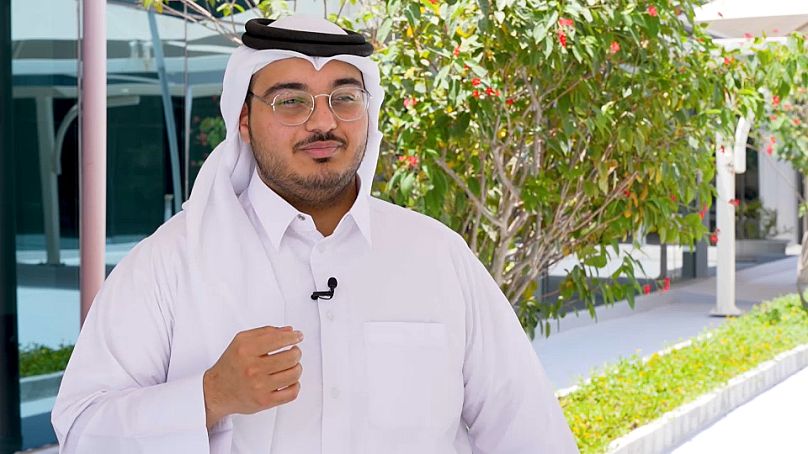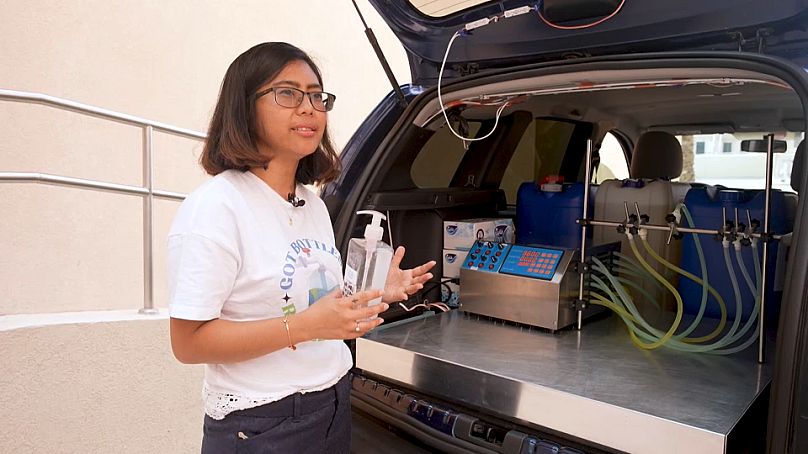In this latest episode of Qatar 365, we speak to activists and entrepreneurs leading Qatar's fight against waste.
Waste not want not. One person’s trash is another person’s treasure. These are some proverbs that show caring for the environment through sustainable living is not a new concept. In fact, it’s something that’s been passed down for generations, transcending culture and ethnicity.
In this latest episode of Qatar 365, we discover some grassroots initiatives happening in Qatar, including during Ramadan, the Muslim holy month which began in March this year.
Education City: Fighting food waste
As the sun sets on Doha’s Education City, 1500 people gather in a tent, to break their fast together - with an eco-friendly twist.
"So this iftar [the fast-breaking evening meal in Ramadan] is a little bit special because we’re aiming towards zero waste," explained Simon Jones, Engagement & Activation Expert at the Qatar Foundation.
"There will be no food waste in this event and there will be no waste from the packaging either. So all the way through the cycle, the packaging is compostable and biodegradable and all the excess food waste, it goes into a separate bin and it gets composted and that gets used within the landscaping around Education City."
In addition to the personal time for reflection during Ramadan, there’s also a large community-building aspect where Muslims quite literally break bread together.
At a Zero-Waste Iftar in Education City, it takes a communal effort to ensure all food materials are composted and recycled, reducing the community’s carbon footprint.
"As soon as people finish their meal, they’ll get up, they’ll walk outside and we’ve got two separate bins. So one bin is for the dry waste, that’s the packaging of the food. And one bin is for the actual food that’s left over," Simon Jones told Euronews, adding "The food waste will get collected and taken to this composting machine. It’ll get cycled for 24 hours and then left to rest for 14 days and then after that, it’s turned into compost."
This Zero-waste iftar is one of many green initiatives taking place across the city.
Aisha Al Maadeed believes small actions like this, done by many people, can result in a big impact. She founded the Qatari youth-based initiative Greener Future in 2018, encouraging people to put the planet first.
"We transfer plastic and recycled papers into an art piece, just to show the kids that we can re-use our stuff - and not just trash them - to recycle them," said Aisha Al Maadeed.
"It's a message that I need to take care of the environment and spread this awareness. But not by judging the people, just to explain for them why it’s important because it’s our environment and it’s our planet. We don’t have another planet, there’s no planet B."
Protecting the planet is a key objective of the United Nations 17 Sustainable Development Goals, adopted in 2015. To meet these goals locally, Oweis Al Salahi helped launch the only youth-led UN Good Practices Initiative in the Gulf, SDGeneration Network.
"It started back in 2019 as a youth-led platform for the youth, by the youth to amplify the voices of those that want to make change," he explained.
"It all starts with awareness of the goals. It all starts with knowing what the issue is, knowing how we can bring forward solutions to the table. Having the youth be at the table, that’s something that I firmly believe in. And of course collaborating and aligning with the same goals is of course a great first step to sustainable development."
Back at the Ramadan tent, the zero-waste target is still a work in progress, but community leaders have committed to protecting the planet.
"There’s a hadith that says no one really truly believes until they love for their brother or sister what they love for themselves. So just like you want that water, just like you want that meal, you’ve got to think that the person behind you or next to you also wants that meal," explained Sulaiman Timbo Bah, the Community Engagement & Outreach Coordinator at Education City Mosque.
"And I think that’s what we’re trying to help people remember with this exercise of being sustainable when they’re eating, not wasting, finishing what they have in their box."
Sulaiman Bah helped organise the community iftar. And says it’s a pillar of faith.
"As long as you’re thinking about somebody else, I think you just take what it is that you need. There are many verses in Quran that says ‘kulu washrabu’ - eat and drink. This is all you need but don’t waste."
Living in harmony with nature
That idea of taking only what we need from the environment without harming it, has very deep roots in Islam. That’s why one Bedouin environmental activist is calling on every person in Qatar to plant one tree, or preserve one.
Ali Taleb Al Henzab owns a farm about an hour west of Doha. He believes indigenous knowledge can be used to protect the planet.
"We regard plants as the factories of oxygen. God forbid, our livestock would be in danger without vegetation," he told Euronews. "Today, we cultivate a variety of plants and trees in order to provide insurance for livestock, insurance for the weather, and air purification."
"People who go out in the desert should not harm the environment or be enemies to the environment, we must leave the place as it was. Second, we plant the plants in the soil based on where they originate from, plants in the mountains belong to the mountains, plants in the desert plants belong to the desert, and so on. Third, we select trees during the farming season by considering the positions of stars and areas with rainfall. This approach reduces the amount of attention and care they need," he added.
Ali Taleb Al Henzab acquired many of his skills through his father and grandfather, who also taught him the importance of living in harmony with nature.
"I have lived my entire life with my grandfather, whom I regard as a moving school. He has taught me plenty of things. The first thing I learned was that our natural environment is our home, our way of life, and the core of our existence. So, as much as we could, we had to maintain the original water supplies and groundwater itself and preserve the trees without necessarily having to lumber them; we took what we needed from the ground and left the rest for future generations, which is exactly what sustainability entails. We worked by that instinctively."
"Today's youth are the centre of existence; they are our future generation and the labour force. Today, young people are everywhere. It is crucial to enlighten them that this environment belongs to them and their future generations. When our children face environmental challenges in the future, there may not be immediate solutions available. Therefore, I have a message for everyone around the world: plant trees. Whether it's by the riverside, in blooming fields, or even on rooftops, planting trees is essential because our lives are intertwined with them."
Ditching plastics for the planet
Single-use plastics and packaging waste are the biggest culprits for the millions of tonnes of trash that end up in the world’s oceans and landfills. The solution to cut that is simple enough - switching to eco-friendly or biodegradable options. In Qatar, more companies are finding ways to dump plastics for good.
Qatari start-up Enavra makes biodegradable cutlery made from compost and food waste. The idea started in 2019, when co-founders Saoud Al Emadi and Abdullah Shaat were still engineering students.
"We went to certain cafes that had these paper straws that were very challenging to actually drink from," revealed Saoud Al Emadi. "And so, we proposed the idea of providing a good eco-friendly substitute to the owners, and they were very interested."
After testing out different materials, Saoud and Abdullah’s ‘eureka’ moment came when the two found out that avocado seeds take a much shorter time than the others to decompose naturally. And that sparked an idea in the young entrepreneurs.
"Avocado seeds, being one of the leading waste materials that did have the fundamental component that makes it a bioplastic that is also compostable and biodegradable," he added.
And so far, the business is bearing fruit. From the factory, Enavra’s biodegradable cutleries make their way to cafes and restaurants all around Qatar. And as more companies make the switch to ditch single-use plastics, the decision to partner up with Enavra is a no-brainer for business owners.
"By switching to Enavra products, you are choosing a higher quality, eco-friendly product that is biodegradable within one year. So you contribute to saving the environment and reducing plastic waste," said Abdullah Shaat. "And also you are choosing a product that is very competitive in pricing compared to the rest of the eco-friendly products.
From upcycling to reusing
In another part of Doha, Victoria Hamade is busy handling orders for her eco-friendly business, Refill2Save.
The start-up encourages people to reuse plastic bottles by refilling them with cleaning products, which it sells. From hand soap to laundry detergent, to floor cleaners, Victoria makes it easy for customers, by bringing the products to them.
"Because we want to be mobile, we want to be available not just in Doha, but in other nearby municipalities, too. It's important to be convenient for our customers because we are asking them to change their mindset," she said.
Today, she’s parked her mobile refilling station at Qatar Foundation’s Awsaj Academy, where both students and teachers have brought their own empty plastic bottles to get a refill of their choice of cleaning product.
For the school, teaming up with Victoria is also a way to educate students and instil small eco-friendly habits in them from young, that they’ll hopefully keep as adults. Educating the young is also a big part of Victoria’s mission, hoping to bring society back to a time that consumed less.
"What I really want to achieve here is for people to actually go back to the reuse culture because decades ago, that's what we [used to] do. We [would] reuse the glass bottles for milk and other consumables. And then this came, that throw-away culture which became prevalent. I want us to go back to reusing," she concluded.













